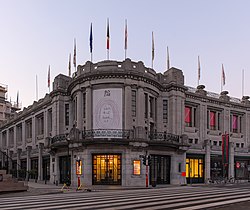The Centre for Fine Arts[1][2] (French: Palais des Beaux-Arts; Dutch: Paleis voor Schone Kunsten) is a multi-purpose cultural venue in the Royal Quarter of Brussels, Belgium. It is often referred to as BOZAR (a homophone of Beaux-arts) in French or by its initials PSK in Dutch. This multidisciplinary space was designed to bring together a wide range of artistic events, whether music, visual arts, theatre, dance, literature, cinema or architecture.
 Exterior of the Centre for Fine Arts building (BOZAR) in Brussels | |
 | |
| Address | Rue Ravenstein / Ravensteinstraat 23 1000 City of Brussels, Brussels-Capital Region Belgium |
|---|---|
| Coordinates | 50°50′37″N 4°21′35″E / 50.84361°N 4.35972°E |
| Public transit |
|
| Type | Performing arts centre |
| Construction | |
| Opened | 1929 |
| Architect | Victor Horta |
| Website | |
| Official website | |
The building housing the Centre for Fine Arts was designed by the architect Victor Horta in Art Deco style, and completed in 1929 at the instigation of the banker and patron of the arts Henry Le Bœuf. It includes exhibition and conference rooms, a cinema and a concert hall, which serves as home to the Belgian National Orchestra (BNO). It is located at 23, rue Ravenstein/Ravensteinstraat, between the Hôtel Ravenstein and the headquarters of BNP Paribas Fortis, and across the street from the Ravenstein Gallery. This site is served by Brussels-Central railway station and Parc/Park metro station on lines 1 and 5 of the Brussels Metro.
History
editConstruction (1923–1929)
editVictor Horta began designing the Centre for Fine Arts in Brussels following World War I, in a more geometric style than his previous works, similar to Art Deco. The Belgian Parliament initially denied funding for the plans.[3] With the founding of the Société du Palais des Beaux-Arts in 1922, the project was revived. Construction started in 1923,[4] albeit with several restrictions: the Brussels authorities supplied a very irregular area on the slope between the city's upper and the lower part, the main facade had to house shopping facilities, and the height of the building was restricted so as not to compromise the King's view of Brussels' skyline from the Royal Palace.[5]
The building was originally intended to be built of stone, but Horta made a new plan of reinforced concrete with a steel frame. He had intended the concrete to be left exposed in the interior, but the final appearance did not meet his expectations, and he had it covered. It took more than a decade to complete the complex, which contains a large concert hall—the Henry Le Bœuf Hall—in an unusual ovoid, or egg shape. It is accompanied by a recital room, a chamber music room, lecture rooms, and a vast gallery for temporary exhibitions. He managed to put together this array of different functions on a rather small building plot with restricted conditions using more than eight building levels with a large part situated underground.
Contemporary (2000–present)
editSince 2002, the Belgian federal intuition has chosen the brand name BOZAR, which has eight artistic departments: BOZAR Expo, BOZAR Music, BOZAR Cinema, BOZAR Dance, BOZAR Theatre, BOZAR Literature, BOZAR Studios and BOZAR Architecture. BOZAR is home to the National Orchestra of Belgium, the Société Philharmonique/Philharmonische Vereniging, which invites the world's major orchestras and performers to appear at the Henry Le Bœuf Hall. The finals of the Queen Elisabeth Competition for classical singers and instrumentalists, one of the most challenging and prestigious competitions of the kind, are also held there. Up to ten exhibitions a year are organised at BOZAR, and have included Jeff Wall, Luc Tuymans, Frida Kahlo, Lucas Cranach, Gilbert & George, Wim Delvoye, Venetian, Flemish Masters, Keith Haring and "It's not only rock'n'roll Baby".
Directors
edit- Robert, 7th Duke d'Ursel, President of the Centre for Fine Arts
- 1974–1986 Karel Geirlandt, Director-General of exhibitions of the Centre for Fine Arts[6]
- 1998–2021: Etienne Davignon, President of the Centre for Fine Arts[7]
- 2002–2021: Paul Dujardin, Director-General of BOZAR[8]
- 15 October 2021–29 May 2022: Sophie Lauwers, Director-General of BOZAR for a brief period of seven months[9]
- 1 February 2023–ongoing: Christophe Slagmuylder, Director-General of BOZAR[10]
Facilities
edit- Henry Le Bœuf Hall, with seating capacity for 2,200
- Chamber Music Room, with seating capacity for 476
- Victor Horta Hall (Great Sculpture Hall)
- Studio Recital Hall, with seating capacity for 210
- Salle Terarken, a multi-purpose hall
- Exhibition rooms
Gallery
edit-
Vestibule
-
Henry Le Boeuf Hall
-
Exhibition hall
-
Interior
-
Window
See also
editReferences
editCitations
edit- ^ "Centre for Fine Arts | Bozar Brussels". www.bozar.be. 27 December 2023. Retrieved 6 January 2024.
- ^ "Centre for Fine Arts - Bozar". www.visit.brussels. Retrieved 6 January 2024.
- ^ Background on Horta, on bozar.be Archived 2 April 2015 at the Wayback Machine (in English)
- ^ Aubry & Vandenbreeden 1997.
- ^ Wonderful Concert Halls in Europe Echo, Neils Le Large
- ^ "Huldetentoonstelling Karel Geirlandt in galerie Campo". De Tijd. 2 February 1990. Retrieved 3 July 2022.
- ^ "Etienne Davignon quittera la présidence de Bozar". RTBF (in French). Retrieved 3 July 2022.
- ^ "Paul Dujardin to remain Head of Bozar". 8 February 2014. Archived from the original on 30 March 2014.
- ^ Times, The Brussels. "Bozar director-general Sophie Lauwers dies aged 55". www.brusselstimes.com. Retrieved 6 January 2024.
- ^ "Christophe Slagmuylder appointed Director General of Bozar | Bozar Brussels". www.bozar.be. 25 November 2022. Retrieved 28 March 2024.
Bibliography
edit- Aubry, Françoise; Vandenbreeden, Jos (1997). Horta: Art Nouveau to Modernism. New York: Harry N Abrams. ISBN 978-0-8109-6333-7.
- Montens, Valérie (2000). Le Palais des Beaux-Arts. La création d'un haut lieu de culture à Bruxelles (1928-1945) (in French). Brussels: Editions de l'université de Bruxelles. ISBN 978-2-8004-1229-0.
- Le Patrimoine monumental de la Belgique: Bruxelles (PDF) (in French). Vol. 1C: Pentagone N-Z. Liège: Pierre Mardaga. 1994. pp. 159–163.
External links
edit- Media related to Bozar at Wikimedia Commons
- Official website